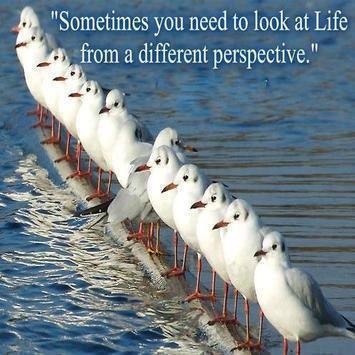Perspective is a remarkable thing. It defines what an artist does when giving proper height, width, depth and position to various objects or scenes when viewed from a particular vantage point. The viewer sees the objects and scenes as if they would appear in nature – no distortions.
What really makes perspective interesting, however, is that it has an obvious spiritual application as well. In a sense, it makes an artist of each of us. We each draw conclusions in our minds’ eye regarding spiritual matters. A mental picture is painted based on how we perceive spiritual truth. God’s truth is as unchanging as any beautiful mountain scene that has been recorded on canvas – no distortions. But our challenge as God’s children is to mature enough to come to see His unchanging truth without the distortions that spiritual immaturity so easily paints in our minds.
The apostle Paul wrote, “When I was a child, I spoke as a child, I understood as a child, I thought as a child; but when I became a man, I put away childish things. For now we see in a mirror, dimly, but then face to face. Now I know in part, but then I shall know just as I also am known” (1 Corinthians 13:11-12).
Just as going from childhood to adulthood on a physical level involves a natural maturing process, so does the spiritual life of a child of God. No one can stop the physical maturation process. We all, whether converted or not, will experience changes in thoughts, speech, and understanding as we age. Paul’s point is that spiritual maturity is something we grow in as well. The only difference is that it’s not an automatic process. Spiritual maturity involves perspective.
That perspective is gained in coming to perceive God’s truth just as He presents it – without distortion, which is another way of saying without pride, a powerful distorter of truth. Imagine the magnitude of the perspective change in the early church after Peter had baptized Cornelius and his family. And yet when the brethren in Jerusalem heard Peter’s account, they first became silent and then glorified God saying, “Then God has granted to the Gentiles repentance to life” (Acts 11:18). Most humbly saw and accepted the truth without distortion. That issue, however, was a problem for some because they arrogantly clung to their own perspective.
The godly perspective doesn’t come automatically, we must consciously choose it. That’s why it’s something we need to think about seriously. Those in Laodicea were failing spiritually which is why Christ said, “I counsel you to buy from Me gold refined in the fire, that you may be rich; and white garments, that you may be clothed, that the shame of your nakedness may not be revealed; and anoint your eyes with eye salve, that you may see. As many as I love, I rebuke and chasten. Therefore be zealous and repent” (Revelation 3:18-19).
The picture those in this spiritual condition paint in their minds lacks spiritual perspective. Such a person will see him or herself as in need of no change. We need to ask ourselves if there is some area, any area, in our lives in which we are clinging to our own righteousness and thereby distorting the godly perspective. We are each an artist, and our lives are the pictures we’re painting. With God’s help it, let’s continually sharpen our spiritual perspective.
Marshall Stiver


